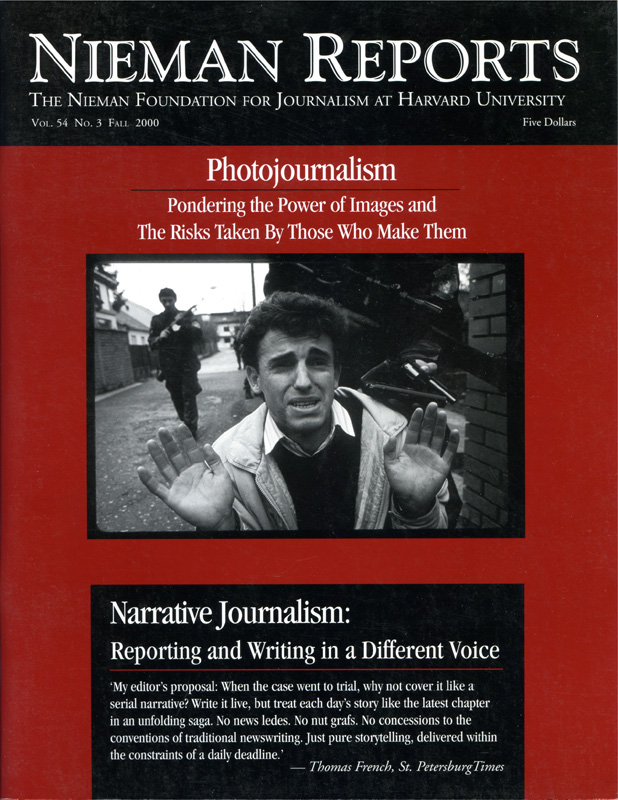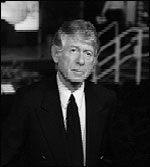
Photojournalism: Pondering the Power of Images and the Risks Taken by Those Who Make Them
James Nachtwey’s book “Inferno” is a collection of 382 photographs depicting the horrific brutality and suffering of people who are entrapped by war, famine or political unrest. Its publication offers an opportunity to reflect not only on his extraordinary and courageous career as a photojournalist but on how, in this time of visual onslaught, images such as these are absorbed and their messages acted upon.
Roone Arledge, the legendary broadcaster who invented ABC’s “Wide World Of Sports” and “Nightline,” may be unaware of his debt to Mark Twain, but it exists nevertheless. The great American humorist once observed that “we are all ignorant; just about different things.” That could very well have been the inspiration for the fashion in which Roone began so many of his “Wide World” segments.
Back in the days when ABC had access to none of the major sports events; when football, basketball and baseball contracts were sewed up by the other major networks, Arledge fashioned a hugely successful series out of the arcane and secondary sports that received little or no attention anywhere else. Since almost nothing was known about the champions of ski jumping or downhill racing, let alone the masters of hurling or the luge, Roone created an introductory segment that he called “up close and personal.” The theory was simple: Give the public a video sketch of these unknown athletes, let us see their training methods, introduce us to their families, and we would have an investment in their success or failure. We would bring a level of interest to the events in which they competed. The concept worked brilliantly.
Among the virtues of a good idea are its portability and adaptability.
When we began “Nightline” in 1980, I took Mark Twain’s admonition to heart and stole Roone’s idea from “Wide World of Sports.” We would assume that people knew nothing about our nightly subjects. Hence the five to seven-minute produced video segments that are, to this day, the hallmark of what we call our “classic” “Nightline” format—or what an irreverent woman staffer in our early days referred to as “an opening piece, Ted and three white guys in suits.”
What does all this rambling background have to do with narrative writing for television? Or, more specifically, what does it have to do with the introductory page in which I try to set the tone for each evening’s program? It is, from my highly subjective point of view, an example of both.
There are, sometimes, nights on which we cover a late-breaking news event; something that has not yet appeared elsewhere. On these occasions, the time-tested formula of answering the “who, what, where, when and why” questions still serves. On most nights, however, we are asking the viewer to invest half an hour of his time in a subject with which he is largely unfamiliar and which seems, at first glance, to be of less than earth-shattering importance. This, at a time of night when sex, sleep, reading, Letterman, Leno and a variety of other television options compete for his attention. The time of night and the diverse competition led me, early on, to the conclusion that the viewer needed to be lulled into a state of complicity. The approach of a storyteller seemed more apt than that of a hard-news journalist. And there is no more seductive approach to telling a story than to elicit from the listener a sense of mild curiosity.
When I do it reasonably well, it brings you to this point.
Ted Koppel is anchor and managing editor of ABC News’s “Nightline.”
Back in the days when ABC had access to none of the major sports events; when football, basketball and baseball contracts were sewed up by the other major networks, Arledge fashioned a hugely successful series out of the arcane and secondary sports that received little or no attention anywhere else. Since almost nothing was known about the champions of ski jumping or downhill racing, let alone the masters of hurling or the luge, Roone created an introductory segment that he called “up close and personal.” The theory was simple: Give the public a video sketch of these unknown athletes, let us see their training methods, introduce us to their families, and we would have an investment in their success or failure. We would bring a level of interest to the events in which they competed. The concept worked brilliantly.
Among the virtues of a good idea are its portability and adaptability.
When we began “Nightline” in 1980, I took Mark Twain’s admonition to heart and stole Roone’s idea from “Wide World of Sports.” We would assume that people knew nothing about our nightly subjects. Hence the five to seven-minute produced video segments that are, to this day, the hallmark of what we call our “classic” “Nightline” format—or what an irreverent woman staffer in our early days referred to as “an opening piece, Ted and three white guys in suits.”
What does all this rambling background have to do with narrative writing for television? Or, more specifically, what does it have to do with the introductory page in which I try to set the tone for each evening’s program? It is, from my highly subjective point of view, an example of both.
There are, sometimes, nights on which we cover a late-breaking news event; something that has not yet appeared elsewhere. On these occasions, the time-tested formula of answering the “who, what, where, when and why” questions still serves. On most nights, however, we are asking the viewer to invest half an hour of his time in a subject with which he is largely unfamiliar and which seems, at first glance, to be of less than earth-shattering importance. This, at a time of night when sex, sleep, reading, Letterman, Leno and a variety of other television options compete for his attention. The time of night and the diverse competition led me, early on, to the conclusion that the viewer needed to be lulled into a state of complicity. The approach of a storyteller seemed more apt than that of a hard-news journalist. And there is no more seductive approach to telling a story than to elicit from the listener a sense of mild curiosity.
When I do it reasonably well, it brings you to this point.
Ted Koppel is anchor and managing editor of ABC News’s “Nightline.”



